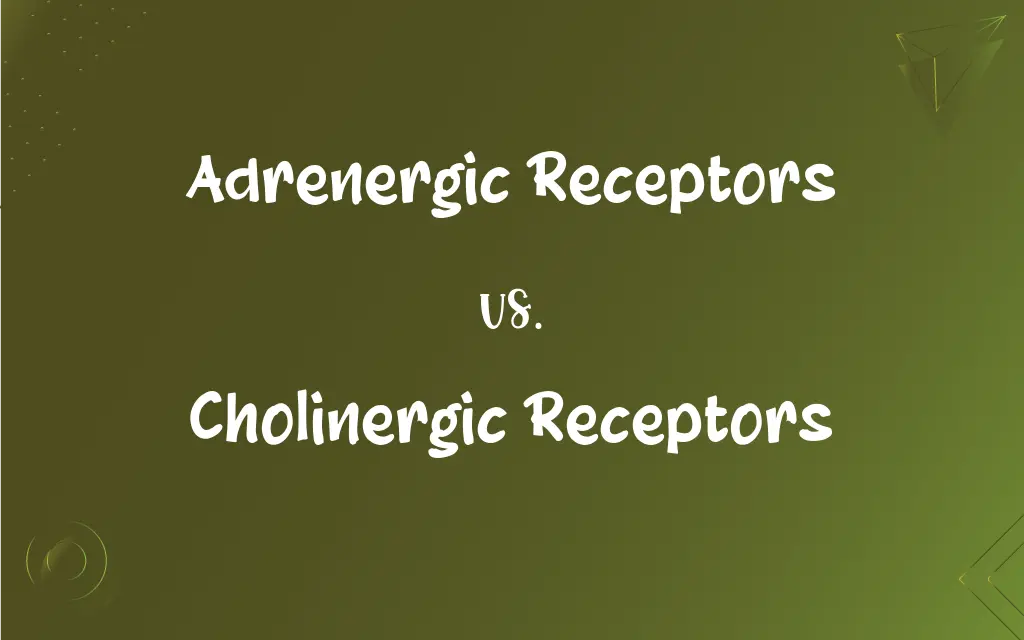Adrenergic Receptors vs. Cholinergic Receptors: What's the Difference?
Edited by Aimie Carlson || By Janet White || Published on January 3, 2024
Adrenergic receptors respond to adrenaline/noradrenaline, while cholinergic receptors respond to acetylcholine.

Key Differences
Adrenergic receptors are protein structures that respond to adrenaline and noradrenaline, key neurotransmitters in the sympathetic nervous system. Cholinergic receptors, in contrast, are activated by acetylcholine, crucial for parasympathetic nervous system functions.
Adrenergic receptors are involved in the body's fight-or-flight response, leading to increased heart rate and energy mobilization. Cholinergic receptors, however, are more associated with rest-and-digest activities, like slowing the heart rate and stimulating digestion.
There are two main types of adrenergic receptors: alpha and beta, each with different subtypes and functions. Cholinergic receptors are divided into two types: nicotinic, found in the nervous system and muscles, and muscarinic, found mostly in the brain and smooth muscles.
Adrenergic receptors play a significant role in respiratory and cardiovascular systems, affecting blood vessels and airway smooth muscles. Cholinergic receptors are vital for cognitive functions, bladder control, and muscle movement.
Drugs targeting adrenergic receptors are used in treatments for asthma, hypertension, and cardiac arrhythmias. Medications targeting cholinergic receptors are utilized for Alzheimer's disease, myasthenia gravis, and urinary incontinence.
ADVERTISEMENT
Comparison Chart
Response to
Adrenaline/Noradrenaline
Acetylcholine
Nervous System Role
Sympathetic (fight-or-flight)
Parasympathetic (rest-and-digest)
Types
Alpha and Beta receptors
Nicotinic and Muscarinic receptors
Primary Functions
Regulate heart rate, blood vessel constriction
Cognitive function, digestion, muscle control
Common Therapeutic Applications
Asthma, hypertension, heart disorders
Alzheimer's, myasthenia gravis, incontinence
ADVERTISEMENT
Adrenergic Receptors and Cholinergic Receptors Definitions
Adrenergic Receptors
Proteins responsive to adrenaline/noradrenaline.
Beta-blockers inhibit certain adrenergic receptors to lower blood pressure.
Cholinergic Receptors
Integral to the parasympathetic nervous system's activities.
Cholinergic receptors help slow the heart rate after stress.
Adrenergic Receptors
Types include alpha and beta, each with different subtypes.
Alpha adrenergic receptors cause vasoconstriction when activated.
Cholinergic Receptors
Proteins that respond to the neurotransmitter acetylcholine.
Cholinergic receptors are crucial for muscle contraction.
Adrenergic Receptors
Involved in the sympathetic nervous system response.
Adrenergic receptors mediate the body's rapid reaction to stress.
Cholinergic Receptors
Affect cognitive functions and bladder control.
Cholinergic receptors are targeted in Alzheimer's disease treatment.
Adrenergic Receptors
Play a role in cardiovascular and respiratory functions.
Activation of adrenergic receptors can alleviate asthma symptoms.
Cholinergic Receptors
Medications aimed at these receptors treat various conditions.
Drugs affecting cholinergic receptors can help manage urinary incontinence.
Adrenergic Receptors
Targeted by various drugs for heart and lung conditions.
Adrenergic receptor antagonists are used to treat arrhythmias.
Cholinergic Receptors
Subtypes include nicotinic and muscarinic receptors.
Nicotinic cholinergic receptors are found at neuromuscular junctions.
FAQs
Are cholinergic receptors involved in the fight-or-flight response?
No, they're more associated with rest-and-digest activities.
Where are adrenergic receptors located?
In various tissues, especially in the heart and lungs.
How do drugs interact with adrenergic receptors?
They can either stimulate or block these receptors to treat conditions like hypertension.
Can cholinergic receptor dysfunction lead to diseases?
Yes, such as in Alzheimer's disease and myasthenia gravis.
What symptoms might indicate an issue with adrenergic receptors?
Abnormal heart rhythms or blood pressure issues.
What's the main function of cholinergic receptors?
They respond to acetylcholine, affecting cognitive and muscular functions.
What are adrenergic receptors?
Proteins that respond to adrenaline and noradrenaline.
How do cholinergic receptors impact the digestive system?
They stimulate digestive activities.
Are cholinergic receptors important for learning?
Yes, they play a crucial role in cognitive functions.
Do adrenergic receptors have subtypes?
Yes, including alpha and beta receptors, each with different roles.
Can adrenergic receptors affect blood vessels?
Yes, their activation can cause vasoconstriction.
Can cholinergic receptors affect heart rate?
Yes, they can slow down the heart rate.
Are there different kinds of cholinergic receptors?
Yes, including nicotinic and muscarinic receptors.
Do cholinergic receptors play a role in muscle movement?
Yes, particularly at neuromuscular junctions.
Can blocking cholinergic receptors have therapeutic uses?
Yes, in treating conditions like overactive bladder.
What is the significance of beta adrenergic receptors in asthma?
They are targeted to relax airway muscles and ease breathing.
What diseases are treated by targeting adrenergic receptors?
Asthma, hypertension, and certain heart conditions.
Are adrenergic receptors targeted for anxiety treatment?
Yes, certain medications can help manage anxiety symptoms.
What role do adrenergic receptors play in stress response?
They mediate the body's physiological reactions to stress.
Are there side effects to medications affecting cholinergic receptors?
Yes, such as dry mouth or blurred vision, depending on the drug.
About Author
Written by
Janet WhiteJanet White has been an esteemed writer and blogger for Difference Wiki. Holding a Master's degree in Science and Medical Journalism from the prestigious Boston University, she has consistently demonstrated her expertise and passion for her field. When she's not immersed in her work, Janet relishes her time exercising, delving into a good book, and cherishing moments with friends and family.
Edited by
Aimie CarlsonAimie Carlson, holding a master's degree in English literature, is a fervent English language enthusiast. She lends her writing talents to Difference Wiki, a prominent website that specializes in comparisons, offering readers insightful analyses that both captivate and inform.






































































